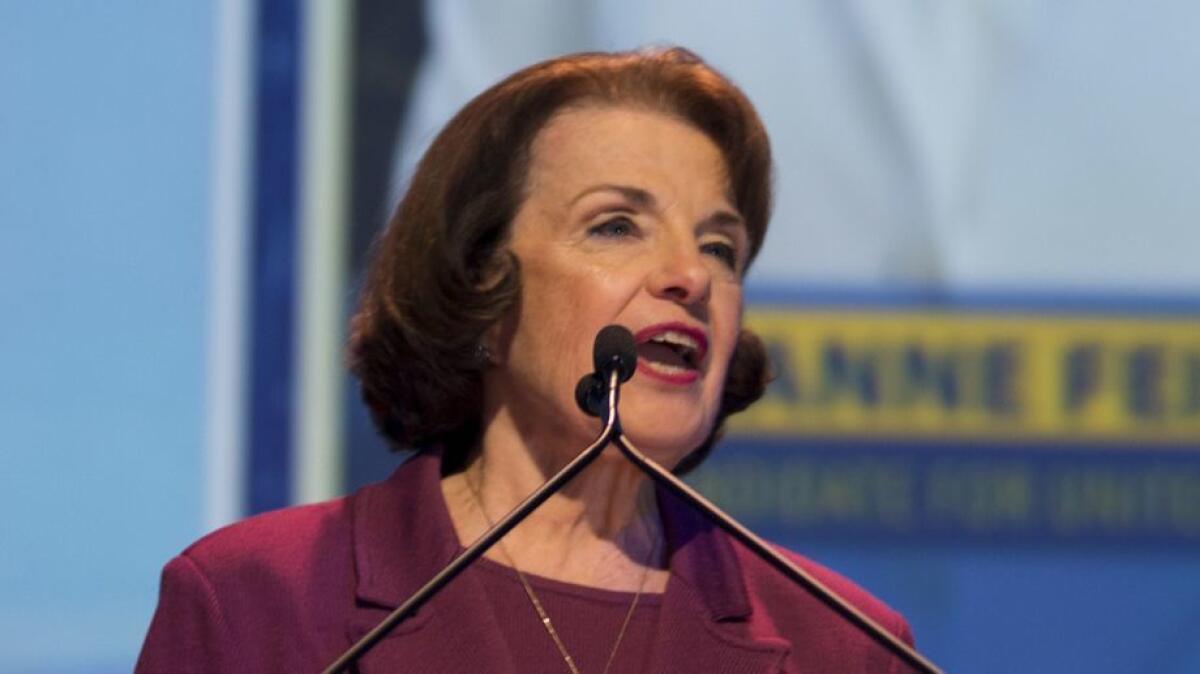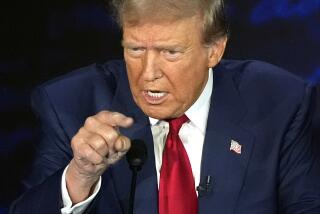Will President Trumpās attacks on Sen. Dianne Feinstein help or hurt her in liberal California?

With President Trump smiling from the podium, the crowd chanted a familiar slogan at a Republican rally in Iowa this week, but with a new target in mind.
āLock her up! Lock her up!ā they roared of Sen. Dianne Feinstein after Trump had speculated that the California Democrat leaked a letter from Christine Blasey Ford in which Ford accuses Justice Brett Kavanaugh of sexually assaulting her when they were teenagers.
Feinstein was getting the treatment once reserved for Hillary Clinton. But as she faces a reelection challenge from within the left wing of her party in deep-blue California, itās hard to say whether it hurts or helps her campaign.
After more than two decades in office, Feinstein is facing heightened opposition from some California Democrats who argue that she isnāt progressive enough to continue representing the state. Her opponent for U.S. Senate, state Sen. Kevin de LeĆ³n, has argued that Feinstein is out of touch with what āworking Californiansā need.
Q&A: Feinstein and De LeĆ³n on priorities, diversity and what theyād like to ask each other Ā»
The dynamic of the race has made for strange bedfellows ā with Trump and De LeĆ³n, an outspoken critic of the president, standing at opposite sides of the political spectrum but both criticizing Feinstein. De LeĆ³n has attacked Feinstein on a variety of issues, including immigration and her handling of the Ford matter, arguing sheās now out of touch with voters in California, where anti-Trump fervor is high.
āI know the narrative for Republicans is, sheās not conservative enough as a Democrat, and for Democrats, she may not be progressive enough,ā De LeĆ³n said in an interview. āBut itās not about moving more to the left, or about moving more to the right. Itās about moving forward.ā
One of the critiques De LeĆ³n has voiced about Feinstein is that sheās too willing to compromise.
āThereās nothing wrong with bipartisanship ā thatās a good thing,ā De LeĆ³n said. āBut when you subscribe to the same country club rules of the past 25 years, it hurts everyday Californians. She hasnāt realized the rules of the game have changed dramatically in Washington with this new president.ā
Feinsteinās campaign has regularly rejected the notion that she isnāt progressive enough. She supports universal healthcare and an assault weapons ban, and has worked with the United Farm Workers labor union to create legislation to provide a pathway to legal status and citizenship for farmworkers.
āFor months, [De LeĆ³n] has been saying sheās not sufficiently anti-Trump, or that sheās not progressive enough, and none of that is true,ā said Feinsteinās longtime strategist Bill Carrick. āItās almost laughable ā because sheās progressive on all sorts of issues that are well-known to voters, and the reason she got over 70% of the Democrats in the primary to vote for her was because they know that.ā
Feinstein has long upset the more liberal wing of her party ā but within the past year, she has offered up some surprises.
In May, she confirmed that she no longer supports the death penalty, a monumental policy shift after decades of supporting it. That same month, Feinstein told the Sacramento Bee that she āstrongly supportsā a federal law keeping the government from interfering in states like California that legalize marijuana use. Feinstein had long opposed legalized marijuana.
Still, De LeĆ³n has criticized Feinstein repeatedly for what he views as a lackluster record on immigration reform. In September, he released a campaign video that attempted to link decades-old statements that Feinstein made about immigration with current statements from President Trump.
De LeĆ³n has said that comprehensive immigration reform is a crucial issue for any California senator and has said he will make it a top priority. Itās personal to him, growing up with his single immigrant mother who worked as a housekeeper. De LeĆ³n has implied that his personal experience gives him more passion for the issue than Feinstein.
He grabbed hold of the controversy surrounding Feinstein during the Kavanaugh confirmation hearings when news broke that the senator didnāt immediately release a letter from Ford outlining the night she said Kavanaugh attacked her. Feinstein said she was honoring Fordās request that the accusation be kept anonymous.
The topic of the letter ā and whether Feinstein leaked it, which she has denied ā has been a key talking point for Trump at rallies.
In Iowa this week, he mocked Feinsteinās body language when she was confronted by Republican senators about the letter during the Kavanaugh hearings and told the cheering crowd that he believed Feinstein leaked the letter. (The reporter from the Intercept online news publication who originally reported about Fordās letter tweeted that Feinsteinās staff did not leak the letter to him.) Again at the rally, Trump placed Feinstein among the segment of her party that has said she doesnāt belong with them.
āYou donāt hand matches to an arsonist, and you donāt give power to an angry left-wing mob, and thatās what the Democrats have become,ā Trump said.
Political experts point out that throughout her career, Feinstein has been happy to be categorized as a moderate Democrat.
āTrump is not known for nuance,ā said Jennifer Walsh, a political scientist and dean of the liberal arts and sciences college at Azusa Pacific University. āHe paints caricatures of people ā both people in and outside his party ā and his characterization of her being an ultra liberal is simply not true. If you look at her record, she has been a very mainstream, capital D Democrat.ā
Part of Feinsteinās reputation as a moderate stems from her willingness to compromise, an approach that matches the culture of the Senate, where regardless of party, lawmakers have long agreed to compromise to get anything done, Walsh said.
āIf you really want to get things done, youāve got to have a mindset that ācompromiseā is not a bad word,ā Walsh said. āAnd in California at the state Legislature, you donāt have to. A Democratic supermajority means [senators] donāt have to compromise with Republicans on anything.ā
Feinstein has continued to lead De LeĆ³n in the polls, but the double-digit margin she holds has shrunk since July, when she led by 22 points, according to surveys by the nonpartisan Public Policy Institute of California.
She leads De LeĆ³n by 11 points (40% to 29%) among likely voters, with 8% undecided, recent polls show. Latino likely voters are divided ā 40% for Feinstein, 38% for de LeĆ³n.
And overall, voter turnout for midterm elections is notoriously low. De LeĆ³nās success will hedge on whether he can energize voters in Southern California, where he has a more diverse voting base, and more broadly, whether voters will see enough of a difference between the two Democrats on the ballot ā and then, want to vote against the incumbent.
In the closest thing to a debate likely to happen in this race, Feinstein and De LeĆ³n are expected to discuss their platforms Wednesday at an event organized by the Public Policy Institute of California.
With Trump on the attack, some experts say it makes sense for Feinstein to simply take it in.
āThere is this painting [by Republicans] particularly of middle-aged, white female Democrats as the devil of some kind as particularly untrustworthy,ā said Jessica Lavariega Monforti, a public policy expert and arts and science dean at California Lutheran University. āSo she canāt win ā she canāt fight both narratives, which is why itās a smart decision on her part to act like Kevin de LeĆ³n doesnāt exist.ā
Times staff writer Sarah D. Wire contributed to this report.
More to Read
Sign up for Essential California
The most important California stories and recommendations in your inbox every morning.
You may occasionally receive promotional content from the Los Angeles Times.











